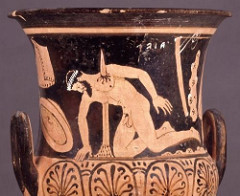 W
WSophocles' Ajax, or Aias, is a Greek tragedy written in the 5th century BC. Ajax may be the earliest of Sophocles' seven tragedies to have survived, though it is probable that he had been composing plays for a quarter of a century already when it was first staged. It appears to belong to the same period as his Antigone, which was probably performed in 442 or 441 BC, when he was 55 years old. The play depicts the fate of the warrior Ajax, after the events of the Iliad but before the end of the Trojan War.
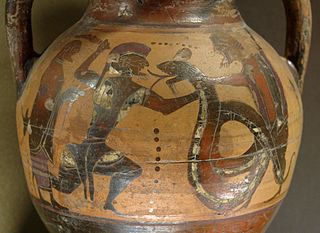 W
WAmphitryon, in Greek mythology, was a son of Alcaeus, king of Tiryns in Argolis. His mother was named either Astydameia, the daughter of Pelops and Hippodamia, or Laonome, daughter of Guneus, or else Hipponome, daughter of Menoeceus. Amphitryon was the brother of Anaxo, and Perimede, wife of Licymnius. He was a husband of Alcmene, Electryon's daughter, and stepfather of the Greek hero Heracles.
 W
WThe Amycos Satyrykos is a fragmentary satyr play by the fifth-century BCE Athenian dramatist Sophocles.
 W
WAntigone is a tragedy by Sophocles written in or before 441 BC.
 W
WElectra, Elektra, or The Electra is a Greek tragedy by Sophocles. Its date is not known, but various stylistic similarities with the Philoctetes and the Oedipus at Colonus lead scholars to suppose that it was written towards the end of Sophocles' career. Jebb dates it between 420 BC and 414 BC.
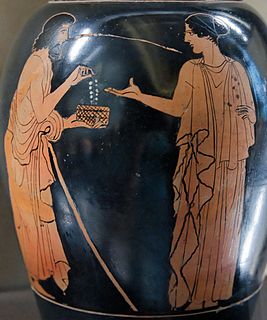 W
WThe Epigoni is an ancient Greek tragedy written by the Greek playwright Sophocles in the 5th century BC and based on Greek mythology.
 W
WThe Epigoni is an ancient Greek tragedy written by the Greek playwright Sophocles in the 5th century BC and based on Greek mythology.
 W
WThe Ichneutae, also known as the Searchers, Trackers or Tracking Satyrs, is a fragmentary satyr play by the fifth-century BC Athenian dramatist Sophocles. Three nondescript quotations in ancient authors were all that was known of the play until 1912, when the extensive remains of a second-century CE papyrus roll of the Ichneutae were published among the Oxyrhynchus Papyri. With more than four hundred lines surviving in their entirety or in part, the Ichneutae is now the best preserved ancient satyr play after Euripides' Cyclops, the only fully extant example of the genre.
 W
WOedipus at Colonus is one of the three Theban plays of the Athenian tragedian Sophocles. It was written shortly before Sophocles's death in 406 BC and produced by his grandson at the Festival of Dionysus in 401 BC.
 W
WOedipus Rex, also known by its Greek title, Oedipus Tyrannus, or Oedipus the King, is an Athenian tragedy by Sophocles that was first performed around 429 BC. Originally, to the ancient Greeks, the title was simply Oedipus (Οἰδίπους), as it is referred to by Aristotle in the Poetics. It is thought to have been renamed Oedipus Tyrannus to distinguish it from another of Sophocles's plays, Oedipus at Colonus. In antiquity, the term "tyrant" referred to a ruler with no legitimate claim to rule, but it did not necessarily have a negative connotation.
 W
WPhiloctetes is a play by Sophocles. The play was written during the Peloponnesian War. It is one of the seven extant tragedies by Sophocles. It was first performed at the City Dionysia in 409 BC, where it won first prize. The story takes place during the Trojan War. It describes the attempt by Neoptolemus and Odysseus to bring the disabled Philoctetes, the master archer, back to Troy from the island of Lemnos.
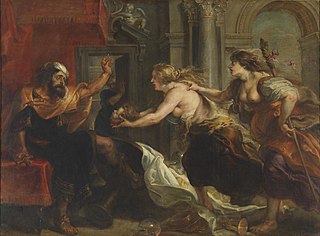 W
WTereus is a lost Greek play by the Athenian poet Sophocles. Although fragments have long been known, the discovery of a synopsis among the Oxyrhynchus Papyri has allowed an attempt at a reconstruction. Although the date that the play was first produced is not known, it is known that it was produced before 414 BCE, because the Greek comedic playwright Aristophanes referenced Tereus in his play The Birds, which was first performed in 414. Thomas B. L. Webster dates the play to near but before 431 BCE, based on circumstantial evidence from a comment Thucydides made in 431 about the need to distinguish between Tereus and the King of Thrace, Teres, which Webster believes was made necessary by the popularity of Sophocles play around this time causing confusion between the two names. Based on references in The Birds it is also known that another Greek playwright, Philocles, had also written a play on the subject of Tereus, and there is evidence both from The Birds and from a scholiast that Sophocles' play came first.
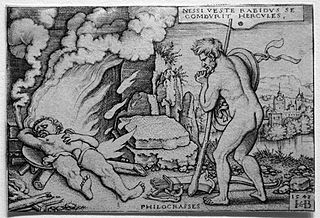 W
WWomen of Trachis or The Trachiniae c. 450–425 BC, is an Athenian tragedy by Sophocles.